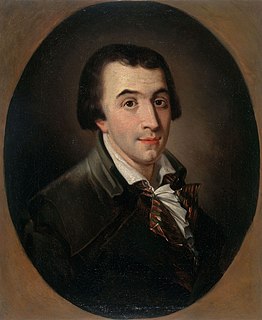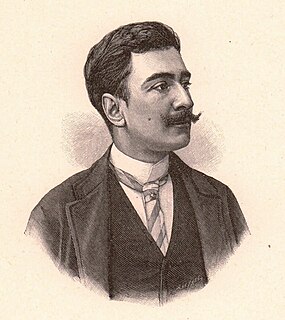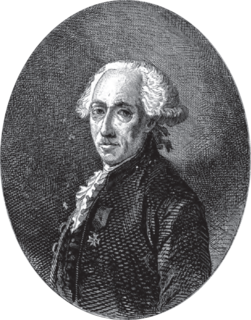Related Research Articles

Benjamin Franklin was one of the Founding Fathers of the United States. A polymath, he was a leading writer, printer, political philosopher, politician, Freemason, postmaster, scientist, inventor, humorist, civic activist, statesman, and diplomat. As a scientist, he was a major figure in the American Enlightenment and the history of physics for his discoveries and theories regarding electricity. As an inventor, he is known for the lightning rod, bifocals, and the Franklin stove, among other inventions. He founded many civic organizations, including the Library Company, Philadelphia's first fire department, and the University of Pennsylvania.

Jacques Pierre Brissot, who assumed the name of de Warville, was a leading member of the Girondins during the French Revolution and founder of the abolitionist Society of the Friends of the Blacks. Some sources give his name as Jean Pierre Brissot.

The Autobiography of Benjamin Franklin is the traditional name for the unfinished record of his own life written by Benjamin Franklin from 1771 to 1790; however, Franklin himself appears to have called the work his Memoirs. Although it had a tortuous publication history after Franklin's death, this work has become one of the most famous and influential examples of an autobiography ever written.

The Orchestre national de France is a French symphony orchestra based in Paris, founded in 1934. Placed under the administration of the French national radio, the ONF performs mainly in the Théâtre des Champs-Élysées from where all its concerts are broadcast. Some concerts are also held in the Salle Olivier Messiaen in the Maison de Radio France.
Thomas-François Dalibard was a French physicist.
La Loge des Neuf Sœurs, established in Paris in 1776, was a prominent French Masonic Lodge of the Grand Orient de France that was influential in organising French support for the American Revolution. A "Société des Neuf Sœurs," a charitable society that surveyed academic curricula, had been active at the Académie Royale des Sciences since 1769. Its name referred to the nine Muses, the daughters of Mnemosyne/Memory, patrons of the arts and sciences since antiquity, and long significant in French cultural circles. The Lodge of similar name and purpose was opened in 1776, by Jérôme de Lalande. From the start of the French Revolution in 1789 until 1792, Les Neuf Sœurs became a "Société Nationale".
The Universal Alliance, formerly known as Universal Christian Church and followers as Christ's Witnesses, is a Christian-oriented new religious movement founded in France in 1952 by Georges Roux, a former postman in the Vaucluse department. Roux claimed to be the reincarnation of Christ and was thus named the "Christ of Montfavet", a village on the commune of Avignon where he lived then.
Jean-François Varlet was a leader of the Enragé faction during the French Revolution. He was important in the fall of the monarchy and the Insurrection of 31 May – 2 June 1793.

ESIEE Paris is a Grande Ecole graduate school of engineering located in Marne-la-Vallée. The school was established in 1904 and is part of the ESIEE network of graduate schools.
Jaume Casals has been the rector of Pompeu Fabra University from 2013 up to 2021. He is full professor of philosophy at UPF since 2003. He received his Doctorate in Philosophy summa cum laude from the Autonomous University of Barcelona.

Robert Charles Henri Le Roux (1860–1925), known by the pen name Hugues Le Roux, was a French writer and journalist who wrote primarily about the French colonies and travel.

Jean-Baptiste Le Roy was an 18th-century French physicist and one of the major contributors to the Encyclopédie by Diderot and d’Alembert for technology. The son of 18th-century Parisian clockmaker and watchmaker Julien Le Roy, he had three brothers: Pierre (1717–1785), a brilliant clock-maker in his own right, Julien-David (1724–1803), a neo-classical architect and archaeologist, and Charles a physician and Encyclopédiste.

Louis-Alexandre de La Rochefoucauld was a French nobleman and politician. He was a member of the House of La Rochefoucauld and a major lord under the Ancien Régime. He also played a political role in 1789 early on in the French Revolution before being executed in the September Massacres. He was a duke, initially with the title 'duc d'Enville' or 'duc d'Anville' and later with that of 6th duc de La Rochefoucauld. He was a cousin to François Alexandre Frédéric de La Rochefoucauld-Liancourt and Ambroise-Polycarpe de La Rochefoucauld-Doudeauville.
Open Educational Practices in Australia refers to the development, implementation and use of Open educational resources (OER), open access, open learning design, open policies, and Massive Open Online Courses (MOOCs) to open up education in Australia.

The Royal Commission on Animal Magnetism involved two entirely separate and independent French Royal Commissions, each appointed by Louis XVI in 1784, that were conducted simultaneously by a committee composed of five scientists from the Royal Academy of Sciences and four physicians from the Paris Faculty of Medicine , and a second committee composed of five physicians from the Royal Society of Medicine .
Thomas Coombe, Jr. was an Anglican priest and a poet.
John Foulke (1757–1796) was an American physician and Quaker.
George Fox was an American Quaker physician.
Louis-Guillaume Le Veillard (1733–1794) was a French chemist, aristocrat and officeholder.
Guillaume Grivel was a French writer, legislator, and educator.
References
- ↑ Manson, Michel (1991). "Être enseignant en France de 1750 à 1800, d'après C.-J. Leroux et le "Journal d'Éducation "". Revue d'Histoire Moderne & Contemporaine. 38 (3): 462–472. doi:10.3406/rhmc.1991.1601.
- ↑ Franklin, Benjamin (2008-01-01). The Papers of Benjamin Franklin: January 21 Through May 15, 1783. Yale University Press. ISBN 978-0-300-13448-3.
- ↑ "Founders Online: To Benjamin Franklin from C.-J. Le Roux, 12 May 1778". founders.archives.gov. Retrieved 2021-05-28.
- ↑ "Founders Online: Search". founders.archives.gov. Retrieved 2021-05-28.
- ↑ "APS Member History". search.amphilsoc.org. Retrieved 2021-05-28.
- ↑ "Founders Online: To Benjamin Franklin from Le Roux, 25 February 1779". founders.archives.gov. Retrieved 2021-05-28.
This article needs additional or more specific categories .(June 2021) |